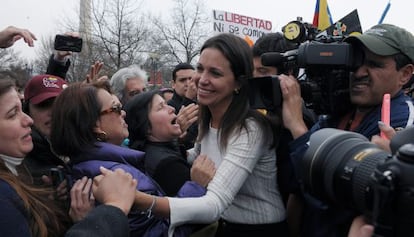Venezuela’s leading opposition deputy kicked out of parliament
Speaker rules that Machado should not have accepted Panama’s offer to address OAS

The Venezuelan National Assembly speaker on Monday kicked out a leading opposition deputy who tried to speak against President Nicolás Maduro at a closed-door meeting of the Organization of American States (OEA) held last week.
Speaker Diosdado Cabello announced that he was stripping María Corina Machado of her seat in the chamber because she violated rules by “accepting a post” with the Panamanian delegation, which ceded its turn to allow her to address the OEA.
In Lima for a human rights event, Machado said she planned on returning to Venezuela to continue her fight to oust Maduro from office.
“Mrs Machado, you have just ceased being a deputy,” said Cabello, who is considered the country’s second-most powerful politician after the president but also one of Maduro's rivals.
At a news conference, the speaker cited two clauses of the Venezuelan Constitution that prohibit lawmakers from keeping their seat in the National Assembly while at the same time accepting honors from foreign governments.
Machado has been a thorn in the side of the Maduro administration since she helped spearhead the nationwide protests that began on February 12 along with fellow opposition leader Leopoldo López, who is being held in a military prison outside of Caracas. The demonstrations have been called to demand Maduro’s resignation, and protest the country’s soaring crime rate and food shortages.
Since the unrest broke out, the death toll stands at 36, with hundreds also injured during clashes between police and demonstrators in cities across Venezuela.
Last week, the ruling United Venezuela Socialist Party (PSUV) parliamentary bench filed a petition with the Attorney General’s Office asking for a preliminary investigation into Machado on charges of treason and fomenting violence. Such an inquiry could lead to the lifting of her immunity as deputy and a subsequent criminal trial.
A floor vote, which could be embarrassing for Maduro, may be avoided
Machado traveled to Washington last week to speak before the regular meeting of the OEA permanent council about the situation in Venezuela. Panama, which filed a petition to include Venezuela as a topic of discussion, offered Machado a seat with its delegation so she could address regional representatives. However, Venezuela’s partners and allies in the leftist ALBA bloc of nations voted to keep Machado from taking the floor at the meeting.
Panamanian President Ricardo Martinelli harshly criticized the OEA for preventing Machado from speaking. Venezuela broke off diplomatic relations on March 6 with the conservative Martinelli government after Panama requested the hearing.
“The National Assembly leadership doesn’t have the powers to replace a deputy,” Machado said from Lima where she is attending an event organized by the International Freedom Foundation, presided by Nobel Prize-winning novelist Mario Vargas Llosa.
“A member of parliament can be replaced through death, resignation or through a serious procedure which includes a preliminary trial base on merits followed by the vote of the entire floor of the National Assembly.” She vowed to attend the next National Assembly session, which was scheduled for later Tuesday.
With Cabello’s decision, a floor vote, which could be an embarrassing move for Maduro and the PSUV, may be avoided. Machado would be replaced by her alternate, Ricardo Sánchez, an opposition deputy who has now sided with the PSUV.
“We have imparted instructions so that woman is not allowed to enter the chamber as a deputy,” Cabello said. “As she will no longer hold her seat, she won’t have access to the parking garage and will no longer have an office.”
Tu suscripción se está usando en otro dispositivo
¿Quieres añadir otro usuario a tu suscripción?
Si continúas leyendo en este dispositivo, no se podrá leer en el otro.
FlechaTu suscripción se está usando en otro dispositivo y solo puedes acceder a EL PAÍS desde un dispositivo a la vez.
Si quieres compartir tu cuenta, cambia tu suscripción a la modalidad Premium, así podrás añadir otro usuario. Cada uno accederá con su propia cuenta de email, lo que os permitirá personalizar vuestra experiencia en EL PAÍS.
¿Tienes una suscripción de empresa? Accede aquí para contratar más cuentas.
En el caso de no saber quién está usando tu cuenta, te recomendamos cambiar tu contraseña aquí.
Si decides continuar compartiendo tu cuenta, este mensaje se mostrará en tu dispositivo y en el de la otra persona que está usando tu cuenta de forma indefinida, afectando a tu experiencia de lectura. Puedes consultar aquí los términos y condiciones de la suscripción digital.








































